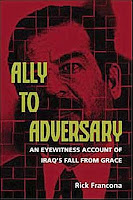 |
| General Norman Schwarzkopf and Major Rick Francona - Riyadh, Saudi Arabia , 1991 |
I received word yesterday that one of the military heroes of our time, and my one-time boss, General Norman Schwarzkopf, had died. I served as his personal Arabic interpreter during Operation Desert Shield and Operation Desert Storm in Saudi Arabia, Kuwait and Iraq. He was 78 years old. It was easily one of the highlights of my career. I wrote a book about my experiences in Iraq in 1988 and my later service as General Schwarzkopf's interpreter and advisor. The book can be found in libraries or online.
I first met General Schwarzkopf at the Pentagon as he was on his way to his new position as the commander of the United States Central Command (CENTCOM), headquartered at MacDill Air Force Base, Florida. I was assigned to the Defense Intelligence Agency (DIA), serving as the Assistant Defense Intelligence Officer for the Middle East.
As part of his orientation to his new command, my boss and I briefed the general on our recent support to Saddam Husayn and the Iraqi military in their eight year war with Iran. As part of that effort, I spent much of 1988 in Baghdad as a liaison officer to the Iraqi armed forces Directorate of Military Intelligence. It was though our provision of intelligence that Saddam's forces were able to defeat the Iranians on the battlefield.
When the Iraqis invaded Kuwait in August 1990, President George H.W. Bush declared that the Iraqi occupation of Kuwait "will not stand." A few days later, the President ordered General Schwarzkopf to begin the deployment of American combat forces to Saudi Arabia to defend the kingdom against a possible Iraqi attack. Almost immediately, the general himself moved to a forward headquarters in Saudi Arabia.
General Schwarzkopf was in need of an Arabic interpreter to help him deal with his Arabic-speaking allies as well as his Arabic-speaking enemies. I received a call at home from a senior officer (and friend) at the Central Command headquarters, asking me if I was interested in being General Schwarzkopf's personal Arabic interpreter - I jumped at the chance, but was concerned that DIA might object. I was wrong - DIA was happy to provide my expertise, or as they put it, "supporting the warfighter." I also learned later that Chairman of the Joint Chiefs of Staff General Colin Powell had put out the word: "when CENTCOM calls for support, the answer is yes." I was on the ground at CENTCOM Forward in Saudi Arabia in two days.
General Schwarzkopf was interested not only in my Arabic language skills, but my previous experience in Iraq with the Iraqi army and air force. While in Baghdad in 1988, I had worked with several of the same officers that were now facing us in Kuwait and southern Iraq. One of these officers was Major General Wafiq al-Samarra'i, the Director of Military Intelligence (DMI) for the Iraqi armed forces.
In 1988, Wafiq (then a brigadier and deputy DMI) was the officer I worked with in providing intelligence information on Iranian targets. By virtue of the information we had provided, he had gleaned some insight to our intelligence capabilities, and would be using this information in his assessments and analysis for Saddam Husayn. Likewise, I had gained an appreciation for Iraqi intelligence and military capabilities through not only working with intelligence officers in Baghdad, but by traveling to the battlefields and observing the Iraqi army and air force in their operations.
Soon after I began my duties at CENTCOM, I was called to meet with the general. He asked me if I could teach him to speak Arabic. I replied - with all due respect - that I could teach him some basic conversational things, but learning Arabic is not a part-time endeavor. After I tried to get him through some basic greetings, the press of preparing to invade Kuwait and Iraq ended, thankfully, the language training.
I felt privileged to sit in on what I knew was going to be history. I, too, was a Vietnam veteran (I was previously a Vietnamese linguist) and was a small part of the rebuilding of the American armed forces into the most lethal and effective killing machine in history. The Iraqis may have been able to defeat the Iranians (with our intelligence assistance), but they were not going to be a match for the best-trained and best-equipped military in the world. The result was a foregone conclusion - the only question was how much American blood it would cost.
Years later, I was hired by NBC News to appear on their family of networks as a military analyst providing my insights into the 2003 American invasion of Iraq. One of my fellow military analysts was none other than retired General Norman Schwarzkopf. We appeared on camera together a few times. I will always remember his kind words, "As you well remember, Rick, when we took on Saddam...."
Right, general. You and me.
It was an honor and privilege to have served as his interpreter. It has, at times to my dismay, defined my military career. No matter what I did before or after that - and I like to think I have made some real contributions - I am best remembered as "Rick Francona, he was General Schwarzkopf's interpreter."




